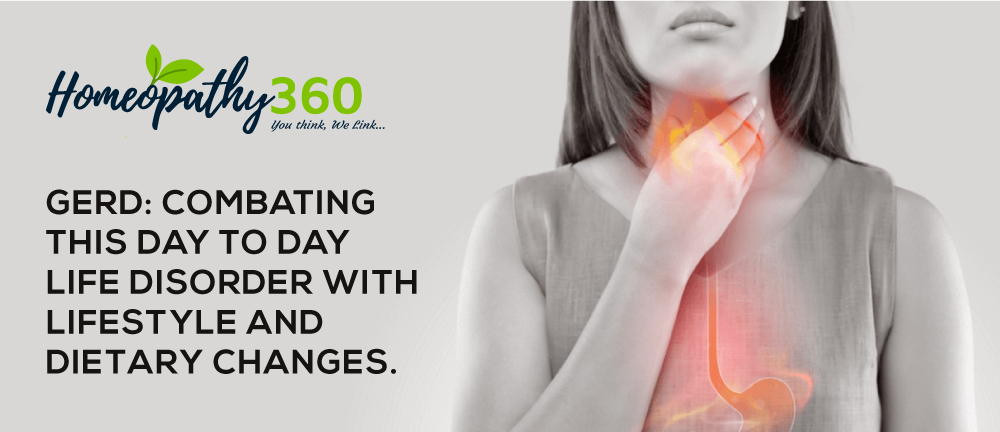
GERD: Combating this day to day life disorder with lifestyle and dietary habits.
Abstract
Gastro esophageal reflux-induced diseases are among the most common disorders and are associated with classical esophageal manifestations of GERD including range of symptoms such as heart burn, acid regurgitation, chest pain and also organic esophageal strictures and ulcerations, Barrett’s esophagus and esophageal adenocarcinoma. Homoeopathy treats the disease at the root and tries to correct the functioning of the digestive system. The prescription of homoeopathic medicine in GERD is based on the current state of the disease, symptoms of GERD, lifestyle, dietary habits and emotional state of patient. Homoeopathic treatment for GERD is completely safe and non-habit-forming.
Keywords
Homoeopathy, gastro-esophageal reflux, heartburn, acidity, epigastric region, peristalsis
Introduction
Currently, GERD (Gastro-Esophageal Reflux Disorder) is one of the commonly observed conditions in youths due to various factors, such as faulty diet and lifestyle, excessive smoking or alcohol consumption, stress, etc.
Normally, when we eat or drink anything, the lower end of the food pipe (lower esophageal sphincter) opens and allows the food to pass into the stomach. Once the process is done, it closes and prevents the backflow of food and stomach juices (acid) to the esophagus.
However, when the lower esophageal sphincter weakens or relaxes abnormally, there is a backflow of stomach content to the esophagus or food pipe, and this backflow is known as gastro esophageal reflux. The reflux of acid may irritate the mucosa of the esophagus and may cause symptoms, such as heartburn, acidity, sour or bitter taste, chest pain, coughing, etc.
GERD is chronic prevalent disorder. The prevalence is 2.5-7.8% in East Asia, 8.7-33.1% in Middle East, 11.6%in Australia, 18.1-27.8% in North America, 23% in South America and 8.8-25.9% in Europe. GERD occurs more in females than in males in older age.
Everyone experiences such symptoms at some point of time in their life, but, if the symptoms persist and start causing discomfort in day-to-day life, it may be termed as Gastro esophageal reflux disease. It is also known as Acid reflux disease. In many patients, GERD can be managed by dietary and lifestyle changes, but some patients may require stronger medications or surgery. (1)
Etiology of GERD:
Multiple factors are responsible for the onset of GERD. Some of the common factors responsible for GERD are listed below. (2)
1) Abnormal functioning of lower esophageal sphincter:
Abnormally weak contractions or relaxation of the lower esophageal sphincter leads to GERD. Certain structural abnormalities, certain types of foods, medications, and beverages may lead to abnormal functioning of LES.
2) Hiatus Hernia
Hiatus hernia is bulging of the upper part of the stomach up into the diaphragm. This bulging cause pressure on and may cause abnormal relaxation or weakness in the lower esophageal sphincter leading to GERD.
3) Delayed stomach emptying:
Due to some reasons, food may remain for a longer time in the stomach causing distension of stomach for a longer time than usual. This may put pressure on lower esophageal sphincter leading to GERD.
4) Stress
Many patients report that emotional or physical stress may trigger or aggravate GERD.
5) Pregnancy
During pregnancy, hormonal changes may slow down the functioning of the digestive system. Thus, the food is pushed down slowly from esophagus to the stomach causing relaxation of the lower esophageal sphincter. In addition to this, as the uterus grows in size, it puts pressure on the stomach and diaphragm leading to reflux.
6) Connective tissue disorder (like scleroderma) may weaken the activity of lower esophageal sphincter.
7) Faulty diet:
- Eating excess of spicy food, pungent food, or fatty food
- Having an excess of coffee or aerated drinks
- Eating citrus fruits
- Excess use of garlic or onion in the diet
- Using chocolates or peppermints
8) Faulty eating habits
- Eating large meals at a time
- Eating late at night
- A long gap between two meals
- Lying down immediately after eating
- A poor posture after eating
9) Faulty lifestyle
- Excess smoking
- Excess use of alcohol
- Lack of sleep
- Lack of exercise
10) Obesity: Excess weight may put pressure on the abdomen and diaphragm leading to abnormal relaxation of the lower esophageal sphincter and reflux.
11) Medication and drugs:
Medications such as, calcium channel blocker, painkillers, antihistamines, sedatives, antidepressants, bronchodilators, some antibiotics, iron supplements, hormone therapy (progesterone), etc. may trigger the onset of GERD.
12) Other medical conditions: Scleroderma, Diabetes, Asthma, COPD, Celiac diseases, etc. may cause reflux and lead to GERD.
What happened in GERD? (Pathogenesis)
When we eat, food or liquid goes from the food pipe (esophagus) to the stomach through the junction at the lower end of the esophagus and the stomach. This muscular gateway or junction is called the lower esophageal sphincter. Normally, this sphincter remains closed to prevent the reflux of stomach content into the esophagus.
However, when, due to some reason, this sphincter becomes relaxed or weak, it may not function properly and allow the content of the stomach and acid to flow back to the esophagus. This causes irritation and inflammation of the mucosa of the esophagus and causes symptoms, such as heartburn, acidity, sour or bitter taste, chest pain, etc. Many individuals experience this reflux and this may stop after slightest dietary modifications or lifestyle changes. Persistence of these symptoms may lead to gastro esophageal reflux disease or GERD.
Dietary habits or factors, certain faulty lifestyle habits, and stress are common factors responsible for the occurrence of GERD in individuals who are prone to develop it. In some patients, a condition called hiatus hernia (Bulging of the upper part of the stomach up into the diaphragm) may cause pressure on the lower esophageal sphincter and make it weak leading to GERD. Obesity and pregnancy can worsen the condition. (3)
Management for GERD:
Lifestyle and Dietary Changes-
Dietary and lifestyle changes are the first step in treating GERD. Certain foods make the reflux worse. Suggestions to help alleviate symptoms include: (4)
- Lose weight if you are overweight — of all of the lifestyle changes you can make, this one is the most effective.
- Avoid foods that increase the level of acid in your stomach, including caffeinated beverages.
- Avoid foods that decrease the pressure in the lower esophagus, such as fatty foods, alcohol and peppermint.
- Avoid foods that affect peristalsis, such as coffee, alcohol and acidic liquids.
- Avoid foods that slow gastric emptying, including fatty foods.
- Avoid large meals.
- Quit smoking.
- Do not lie down immediately after a meal.
- Elevate the level of your head when you lie down.
Homeopathic Therapeutics for GERD:
The conventional treatment for GERD involves the use of antacids, which work by changing the pH of the stomach acid to make it less acidic. This helps decrease the irritation caused by the acid to the stomach, esophagus or the duodenum. (5)
Use of antacids for an extended duration can cause side effects like gas, belching, constipation, diarrhea, and swelling of the hands, feet, and ankles. Antacids also interfere with nutrient absorption. Proton pump inhibitors (PPIs), which are used to reduce the production of stomach acid, are known to deplete vitamin B12 in the body. This can further affect the nervous system, cause fatigue, shortness of breath, and loss of vision.
The amount of antacids used, and the duration of their use can affect the electrolyte balance in the body. Any changes in the levels of different electrolytes (like calcium, potassium or sodium) can adversely affect the muscle and nerve function.
Homeopathy, on the other hand, works gently to minimize the symptoms of GERD and treats the root cause of the problem. Homeopathy can be of great help to those who do not show much improvement even after lifestyle modifications. The top medicines that are used to treat GERD are:
1. Robinia – For Acid Reflux and GERD
Robinia is a top listed medicine for treating GERD. Robinia is prepared from a plant named ‘yellow locust.’ The natural order of this plant is Leguminosae. The key indication to use this medicine in GERD is intense heartburn, constant sour belching, and sour vomiting due to regurgitation of acid from the stomach. The symptoms of heartburn and acidity tend to get worse at night time, on lying down and can cause sleeplessness.
Key indications for using Robinia for GERD:
-Intense heartburn
-Sour belching and vomiting
-Heartburn and acidity worse at night
2. Iris Versicolor – For Sour, Bitter Belching
Iris Versicolor is a natural medicine for treating GERD. It is prepared from a plant commonly named ‘blue flag.’ The natural order of this plant is Iridaceae. Sour, bitter belching is the key feature to use this medicine. Vomiting of sour bitter fluid that burns the throat, vomiting with weakness, a smarting, burning sensation in the throat, and heartburn are the key symptoms. There may be burning distress and pains in the epigastric region at frequent intervals. Constant nausea may be present with these symptoms.
There is excessive indigestion, and the food is vomited after an hour or so eating a meal. Iris Versicolor is also a well indicated medicine for a headache arising with acidity.
Key indications for using Iris Versicolor:
– Sour bitter belching
– Sour bitter vomiting
– Heartburn; burning in throat
3. Natrum Phos – For Heartburn and Difficulty Swallowing
Natrum Phos is another prominently indicated medicine for GERD treatment. It is useful when heartburn is attended with difficulty swallowing. Other symptoms include sour belching, waterbrash, and vomiting of sour fluid or cheesy, curdled masses. A lump sensation in the throat may also be present, along with a loss of appetite.
Key indications for using Natrum Phos for GERD:
– Heartburn and difficulty in swallowing
– Vomiting of sour, cheesy or curdled matter
Other Important Remedies for GERD:
Arsenic Album – For Burning Pain in Throat
Arsenic Album is a medicine for GERD that is accompanied by a burning pain in the throat. The burning gets worse upon swallowing. Swallowing is difficult and painful. Other symptoms include regurgitation of acrid matter, water brash, heartburn, intense nausea, and weakness. Arsenic Album is also a well indicated medicine for inflammation of the esophagus (esophagitis).
Calcarea Carb – For Sour Taste in Mouth
Calcarea Carb is a well indicated medicine for GERD where there is a sour taste in the mouth. There is a regurgitation of sour substances with the flow of sour, watery fluid from the mouth. Foul odor from the mouth may be present with nausea. Sour, bitter belches, vomiting of sour, bitter slime (of food eaten), and heartburn are some other symptoms that may be present. The burning from the food pipe extends to the throat. Along with this, continued loud belching may appear especially after eating; with a cough and nausea.
Carbo Veg – For Bloating and Heartburn
Carbo Veg is an excellent medicine for GERD treatment. It is useful when there is bloating along with heartburn. Sour, offensive belching that gets worse after drinking or eating, a burning sensation in the throat and difficulty in swallowing are other symptoms. Even the simplest of food tend to trigger the condition.
Nux Vomica – For Acid Reflux with Cough
Nux Vomica is a highly effective medicine for GERD accompanied with a cough. Nux Vomica is one of the best indicated medicines for a gastric cough that gets worse at night time and prevents sleep. Vomiting usually appears from coughing. The throat is sore and raw, and swallowing may be painful. Burning in the throat, especially at night time is present. There is a regurgitation of food with heartburn and sour belching.
Conclusion:
In today’s era people are living a very stressful life as they have to manage their work, family and relations all together with tough competition around them at their work places. We often get to see that people nowadays don’t eat proper diet due to time constraints or any other reason and are getting habituated to junk and packaged food, alcohol, smoking and other stimulants to relieve their stress. The stress in itself along with this kind of diet and sedentary lifestyle has contributed in the increased number of cases of GERD. Homoeopathy is a therapeutic science that doesn’t only deal with the disease per se but considers the underlying cause behind those symptoms. It also helps to resolve the inner conflicts in the life of a person, thus helping him to deal with the stressful situations in a better way. Also these medicines are not at all habit forming like the conventional modes of treatment. From the above facts we can conclude that Homoeopathy is the need of this time when people are majorly suffering from life style and stress related disorders like GERD.
References:
- Colledge N R, Walker B R, Ralston S H, editors. Davidson’s principles and practice of medicine. 21st edition. University of Edinburgh, Edinburgh; 2010. 863p.
- DeMeester T R. Etiology and Natural history of GERD [Internet]. Shackelford’s Surgery of the Alimentary tract; 2019. Available from: https://www.sciencedirect.com/science/article/pii/B9780323402323000169
- Kahrilas PJ. GERD pathogenesis, Pathophysiology and Clinical manifestations [Internet]. Cleveland clinical journal of medicine; 2003. Available from: https://www.researchgate.net/profile/Peter-Kahrilas/publication/8935169_GERD_pathogenesis_pathophysiology_and_clinical_manifestations/links/09e4150a23afd3f5ba000000/GERD-pathogenesis-pathophysiology-and-clinical-manifestations.pdf
- Katz PO, Gerson LB, Vela MF. Guidelines for diagnosis and management of GERD [Internet]. American Journal of Gastroenterology; March 2013. Available from: https://journals.lww.com/ajg/Fulltext/2013/03000/Guidelines_for_the_Diagnosis_and_Management_of.6.aspx
- Sharma V. Top Homoeopathic medicines for GERD, Acid reflux and Heartburn [Internet]; 2021. Available from: https://www.drhomeo.com/gerd/heartburn-gerd-acid-reflux-homeopathy/#wrap
Prof. Dr.Anureet
B.H.M.S. MD. (hom) PGD counseling & spiritual health
HOD Organon of Medicine & Homoeopathic Psychology
Homoeopathic medical college & hospital sector 26 Chandigarh
Gurleen Kaur
B.H.M.S. Intern




